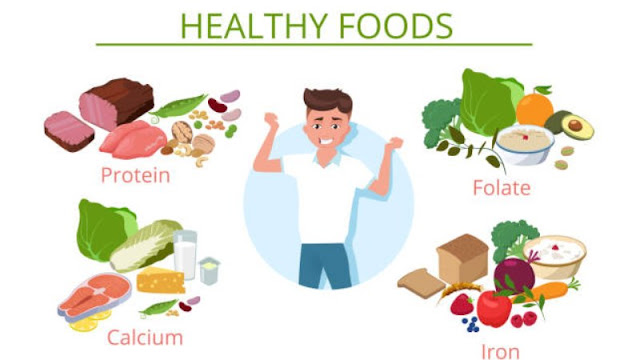Macronutrients: Essential Elements for a Well-Balanced Diet in Adults

Introduction
Maintaining a well-balanced diet is crucial for overall
health and well-being. Macronutrients, consisting of carbohydrates, proteins, and
fats, play a pivotal role in providing the energy and building blocks necessary
for the body's functions. This thing explores the significance of each
macronutrient and offers insights into achieving a balanced and nutritious diet
for adults. Read More: biztipsweb
Carbohydrates: Fuel for the Body
Types of Carbohydrates
Carbohydrates are the body's primary source of energy. They
are classified into two main types: simple carbohydrates (sugars) and complex
carbohydrates (starches and fibers). While simple carbohydrates provide quick
energy, complex carbohydrates offer sustained energy release.
Importance of Carbohydrates
Carbohydrates are essential for various bodily functions,
including brain function. The body converts carbohydrates into glucose, which
fuels the brain and muscles. However, the quality of carbohydrates matters;
opting for whole grains, fruits, and vegetables is preferable over refined
sugars.
Recommended Intake
The dietary guidelines recommend that 45% to 65% of daily
caloric intake should come from carbohydrates. Balancing the types of
carbohydrates consumed is crucial for optimal health.
Proteins: Building Blocks of Life
Protein Structure and Sources
Proteins are made up of amino acids, which are essential for
the body's growth, repair, and maintenance. There are two main types of
proteins: complete proteins (found in animal products) and incomplete proteins
(found in plant sources). It's important to consume a variety of protein
sources to ensure an adequate intake of all essential amino acids.
Importance of Proteins
Proteins play a crucial role in building and repairing
tissues, producing enzymes and hormones, and supporting immune function.
Including lean meats, dairy products, legumes, and nuts in the diet ensures a
diverse range of amino acids.
Recommended Intake
The recommended daily allowance for protein varies based on
factors such as age, sex, and activity level. On average, adults should aim for
0.8 grams of protein per kilogram of body weight. Athletes and those engaging
in intense physical activity may require higher protein intake.
Fats: Not All Fats Are Created Equal
Types of Fats
Fats are often misunderstood, but they are essential for
various bodily functions. There are different types of fats, including
saturated fats, unsaturated fats (monounsaturated and polyunsaturated), and
trans fats. While saturated fats should be limited, unsaturated fats,
especially those from sources like avocados and nuts, are beneficial.
Importance of Fats
Fats are essential for the absorption of fat-soluble
vitamins (A, D, E, and K), brain function, and hormone production. They also
provide a concentrated source of energy. The key is to choose healthy fats and
moderate overall fat intake.
Recommended Intake
Approximately 20% to 35% of daily caloric intake should come
from fats, with an emphasis on unsaturated fats. Limiting saturated and trans
fats is essential for heart health.
Achieving a Well-Balanced Diet
The Plate Method
The plate method is a simple and effective way to ensure a
balanced diet. Divide your plate into sections: one-half for vegetables and
fruits, one-quarter for lean proteins, and one-quarter for whole grains. This
method helps control portion sizes and ensures a variety of nutrients.
Nutrient Timing
Nutrient timing involves consuming the right nutrients at
specific times to optimize energy levels and recovery. For example, consuming
carbohydrates before exercise provides energy, while consuming protein after exercise
supports muscle repair.
Hydration
Water is a vital component of a well-balanced diet. It aids
in digestion, nutrient absorption, and temperature regulation. Adults should
aim for at least eight 8-ounce glasses of water per day, adjusting based on
individual needs and activity levels.
Common Dietary Challenges
Overconsumption of Processed Foods
The modern diet often includes an excess of processed foods
high in sugars, unhealthy fats, and sodium. These foods can contribute to
weight gain, inflammation, and chronic diseases. Limiting processed food intake
and focusing on whole, nutrient-dense foods is essential.
Inadequate Fiber Intake
Many adults fall short of the recommended daily fiber
intake, which can lead to digestive issues and an increased risk of chronic
diseases. Incorporating whole grains, fruits, vegetables, and legumes into the
diet can boost fiber intake.
Lack of Nutrient Diversity
Eating a variety of foods ensures a diverse intake of
nutrients. A monotonous diet may lead to nutrient deficiencies. Experimenting
with different fruits, vegetables, proteins, and whole grains enhances the nutritional
profile of the diet.
Conclusion
Macronutrients are the cornerstone of a well-balanced diet
for adults. Understanding the role of carbohydrates, proteins, and fats, and
incorporating them in appropriate quantities, is essential for maintaining
optimal health. By focusing on nutrient-dense foods, practicing portion
control, and staying hydrated, adults can achieve a diet that supports overall
well-being and longevity. Embracing a mindful approach to eating and making
informed food choices lays the foundation for a healthier and more vibrant
life.


